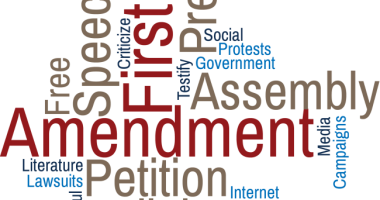
Communications Decency Act - Websites Covered by Section 230
Is an "interactive computer service" some special type of website? No. For purposes of Section 230, an "interactive computer service" means any information service, system, or access software provider that provides or enables computer access by multiple users to a computer server. Most courts have held that through these provisions, Congress granted interactive services of all types, including blogs, forums, and listservs, immunity from tort liability so long as the information is provided by a third party. As a result of Section 230, Internet publishers are treated differently from publishers in print, television, and radio. Let's look at these difference in more detail.

First Amendment
Congress shall make no law respecting an establishment of religion, or prohibiting the free exercise thereof; or abridging the freedom of speech, or of the press; or the right of the people peaceably to assemble, and to petition the government for a redress of grievances.

Business Torts
Business torts are not committed against persons or property. Rather it is harm done to the organization's intangible assets, such as its business relationships with clients or its intellectual property.

Publicity/Privacy Litigation
In Right to Privacy & Right of Publicity Gingras Law will use legal expertise to provide clients with the know-how for them to enforce their privacy and publicity rights. Providing the necessary counseling and guidance to encourage and help clients to be knowledgeable of their rights in such matters as their image, voice, signature or anything else that can be associated exclusively with that particular individual.

Copyright
Copyright is a legal right, existing in many countries, that grants the creator of an original work exclusive rights to determine whether, and under what conditions, this original work may be used by others.

Defamation
Once a defamatory statement is on the Internet, it is hard to change public opinion. Even after removing the content diligent searchers can still find it elsewhere on the web. Proving publication can be tricky, and if you must prove harm to your reputation, that may be done by saving negative comments left by people who read the defamatory story. False statements can reach a large audience of individuals at once when published online, and it is essential that a remedy exists for those who suffer online defamation. A defamatory statement on a blog may be read and then shared via email or sites like Facebook, increasing publication and the damage irrevocably. When the damage to the defamed is significant and quantifiable, sound legal advice is critical. Call to see how Gingras Law can mitigate your situation.